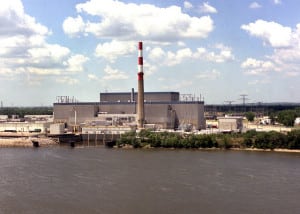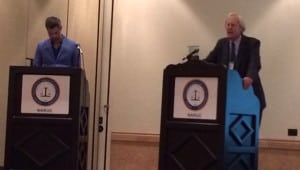Legal & Regulatory
-
Commentary
Utility Regulation, Old and New
God forbid that you have a job that requires you to read the orders issued by public utility commissions (PUCs). As a regulator, I not only have to read them—I have to write them. And even I marvel at the arcane, trial-like proceedings of PUCs and the orders that emerge from them, which are the […]
Tagged in: -
Legal & Regulatory
Utilities Grapple with Storage Integration
As energy storage becomes more ubiquitous and projects grow in size and capacity, utilities of all types are exploring the best ways of putting it to use across the grid. The opportunities are large, but so are the challenges, according to a panel of executives who spoke at Energy Storage North America in October. New […]
Tagged in: -
Legal & Regulatory
Illinois Nuke Bailout Bill Draws Praise, Fire
A mammoth, wide-ranging energy measure under consideration by the Illinois legislature that would provide billions of dollars in support for energy efficiency, microgrids, and—most controversially—the Clinton and Quad Cities nuclear power plants made it out of a key committee on Nov. 29 and could see a final vote by the end of the week. The Future […]
Tagged in: -
Legal & Regulatory
Arrests Made After Scaffold Collapse Kills 74 Workers at Chinese Power Plant
Nine people, including the chairman and chief engineer of the Fengcheng power plant, have been arrested following a scaffold collapse that killed 74 construction workers on November 24. The scaffold platform had been erected to facilitate work on a cooling tower that was being constructed at the plant located in Yichun City, Jiangxi Province. According […]
-
Legal & Regulatory
NRC Begins “Wide-Ranging” Inspection of Pilgrim Nuclear Plant
The U.S. Nuclear Regulatory Commission (NRC) is beginning a comprehensive three-week inspection of the Pilgrim Nuclear Power Plant in Plymouth, Mass., as a result of the plant’s repeated performance deficiencies, the agency said in a November 28 statement. The inspection, planned for more than a year, is part of the NRC’s heightened oversight process, begun […]
-
Legal & Regulatory
State-Level Nuclear Policy Elicits Strong Opinions at Regulators’ Meeting
RESOLVED: Retaining nuclear capacity is necessary to secure a reliable, cost-effective, low-emissions supply of electric power in the United States. That was the proposition for a debate between two high-profile opponents in “A Square-Off on Nuclear Policy” on November 16, the last day of the National Association of Regulatory Commissioners (NARUC) annual meeting in La Quinta, […]
-
Legal & Regulatory
Utility Regulators Take EVs for a Spin
A new feature at the annual meeting of the National Association of Regulatory Utility Commissioners (NARUC) this year is an opportunity to test drive a variety of electric vehicles (EVs). State regulators and others attending the event could sign up to test drive electric models from Tesla, BMW, Nissan, and GM. Between noon and 2:30 […]
Tagged in: -
Legal & Regulatory
Regulators’ Meeting Opens with Focus on Infrastructure Conundrum
“We’re at a very challenging time,” said former Federal Energy Regulatory Commission (FERC) Commissioner Tony Clark at the annual meeting of the National Association of Regulatory Utility Commissioners (NARUC) on November 14. We have a “need for infrastructure, but it’s more difficult to get it sited and built than ever before.” Clark’s comment, which he […]
-
Legal & Regulatory
FirstEnergy Wants Out of Competitive Power Markets
FirstEnergy Corp.—one of the nation’s largest investor-owned electric utilities, serving customers in Ohio, Pennsylvania, West Virginia, Maryland, New Jersey, and New York—has made the strategic decision to exit the competitive power business. “We have made our decision that over the next 12 to 18 months we’re going to exit competitive generation and become a fully […]
-
Legal & Regulatory
Election Roundup: What Trump’s Win Means for Energy and Environment
Donald Trump’s stunning victory in the U.S. presidential election portends enormous changes in U.S. energy and environmental policy, and a nearly complete turnover of the men and women who will administer that policy for the next four years.









